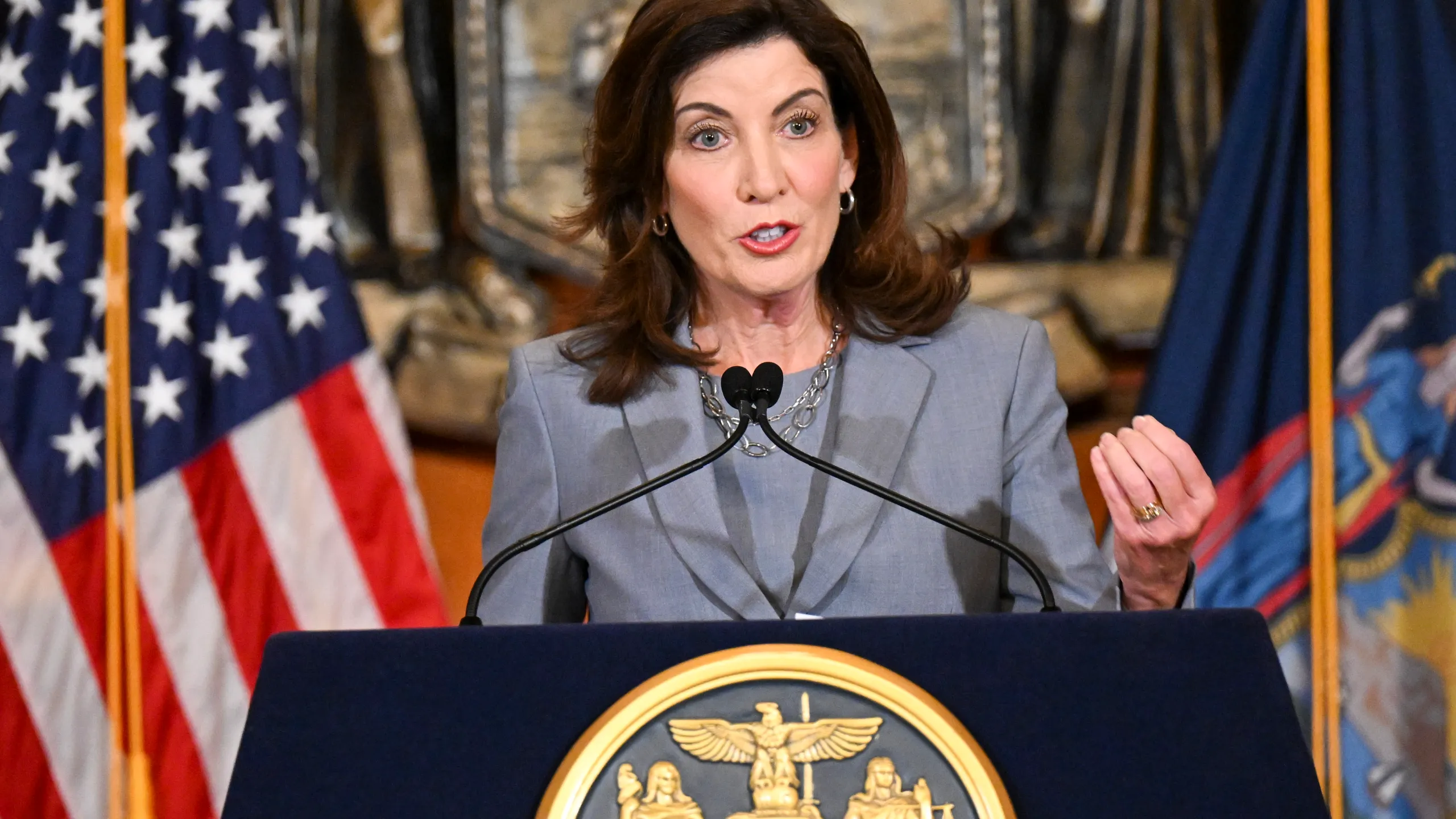After grassroots advocacy from NYS residents, business owners, winemakers, electeds, activists, & more, NYS is now the first state to protect the climate, environment, & local businesses & communities from energy-hogging cryptomining.
Today, Governor Kathy Hochul signed the first-in-the-nation cryptocurrency mining moratorium. The law will put a two-year pause on new and renewed air permits for fossil fuel power plants that house proof-of-work cryptocurrency mining, and require the state Department of Environmental Conservation (DEC) to conduct a study into the practice’s environmental impacts.
Advocates across the state celebrated this precedent-setting step, and urged the Governor to finish the job by shutting down the existing fracked gas-powered Bitcoin mines Greenidge Generation and Fortistar North Tonawanda.
“Thank you, Governor Hochul, for stepping up to protect New Yorkers from corporate bullies who want to exploit communities like mine in the Finger Lakes. The crypto industry is going to whine that this is a blow, but it’s not. Governor Hochul did the right thing by putting real New Yorkers over the failing outside speculators who choose not to mine crypto in more efficient ways that don’t destroy the climate, environment, and local economies,” said Yvonne Taylor, Vice President of Seneca Lake Guardian. “Unfortunately, there are existing cryptominers in New York’s fossil fuel plants, heating up our atmosphere and poisoning our lakes, that aren’t affected by this new law. Governor Hochul can finish the job now by shutting down Greenidge Generation to protect the Finger Lakes.”
On September 15, industry giant Ethereum successfully “merged” from the energy-intensive proof-of-work mining method to proof-of-stake, reducing the cryptocurrency’s energy consumption by 99.95%. Ethereum is the second largest cryptocurrency (after Bitcoin) and its merge confirms that the industry can innovate and upgrade to more sustainable business practices.
Meanwhile, Bitcoin has plummeted 65% this year, and the crypto industry is imploding. Greenidge is in financial ruin, losing $44 million so far this year as its stock tanked 95% (down to $0.68/share last week). The company’s CEO abruptly stepped down. Other Bitcoin miners have been similarly struggling – Compute North recently filed for bankruptcy, and TeraWulf Inc., which operates a Bitcoin mining facility in New York, has seen its stock fall more than 90% this year. By signing the cryptomining moratorium bill, Governor Hochul is putting New York’s homegrown businesses – such as Finger Lakes agritourism – over the false promises of this speculative and volatile industry.
“During the last legislative session, we passed this bill through the Senate and the Assembly despite enormous financial pressure by the crypto industry to kill the bill,” said bill sponsor Assemblymember Anna Kelles. “Today, Governor Hochul has made history by signing this nation-leading piece of legislation into law. This bill will create the pause we need in the current trend of purchasing old power plants in NY for corporate profits and allow us to properly evaluate the impact of this industry on our climate goals before it is too late. We know that we must reduce our total global greenhouse gas emissions by 50% in the next seven years to avoid the worst impacts of climate change. Reactivating old retired power plants that use fossil fuels as an energy source is a move in the wrong direction and we cannot afford to go backwards. I am grateful to Governor Hochul for demonstrating that she is a climate champion who will fight to protect our planet, our precious natural resources, and make sure that New York meets our critically important climate goals. This is an important step and we must keep working together to protect our communities from the worst effects of climate change.”
“Governor Hochul has struck a powerful blow against fracking and fossil fuels,” said Eric Weltman, Senior New York Organizer with Food & Water Watch. “This is a victory for our climate and communities over greedy corporations. By signing the moratorium bill, Hochul has taken an important and necessary step towards moving New York off fossil fuels. New York has no hope of achieving its climate goals if we allow the burning of fossil fuels for cryptocurrency mining. We look forward to Hochul taking the next step and closing the two facilities, Greenidge in the Finger Lakes and Fortistar in North Tonawanda, already using fracked gas for Bitcoin mining.”
“Bitcoin mining has the capacity to undermine New York’s climate goals by extending the lives of dirty fossil fuel plants and increasing pollution in communities that are already burdened with legacy contamination,” said Roger Downs, Conservation Director, Sierra Club Atlantic Chapter. “By signing the proof of work cryptocurrency mining moratorium and requisite environmental review, Governor Hochul is protecting New York’s prosperity with precaution, where other states have overcommitted to bitcoin mining and are now suffering electricity price spikes and grid overload. The Sierra Club commends the Governor for her continued climate leadership and for the tireless efforts of Senator Parker and Assembly member Kelles to advance the moratorium through the legislature.”
“NYC-EJA would like to thank Governor Hochul for signing the crypto-mining moratorium bill (A.7389-C/S.6486-D) into law. Cryptocurrency mining is one of the most unregulated, energy-intensive industries in New York State right now. This legislation will protect our health and environment by closing industry loopholes that undermine the zero-emissions mandate in our landmark Climate Leadership and Community Protection Act. We look forward to continuing working with the Governor on future issues regarding our climate, jobs, and justice in New York State,” said Eddie Bautista, Executive Director, NYC Environmental Justice Alliance.
“Governor Hochul has shown that she is committed to New York State’s climate goals by enacting this two year crypto mining moratorium. For too long the state’s dramatically energy-intensive mining facilities, whose massive carbon footprints exacerbate climate change, have had little oversight,” said Richard Schrader, NY Legislative and Policy Director for NRDC (Natural Resources Defense Council). “Not only does crypto take a toll on the environment, but communities in upstate New York could suffer as once-shuttered power plants come back from the dead as ‘zombie plants’ that mine crypto all day, every day.”
“Thank you to Governor Hochul for prioritizing signing the Cryptomining Moratorium Bill so soon after her election victory. The public’s massive support for the Environmental Bond Act shows that New Yorkers are deeply concerned about the environment. Putting a moratorium in place on cryptomining while evaluating its environmental impacts shows that Governor Hochul shares that concern. We hope this signals that Governor Hochul will continue to be an environmental leader as she enters her new term as New York’s first elected woman governor,” said Irene Weiser, coordinator of Fossil Free Tompkins.
“As a New Yorker who owns property near the Greenidge cryptomining gas plant, I know first hand the way these facilities jeopardize the well-being of communities. No one should have to go through what my community has been enduring – this should not be a town by town fight – which is why I am thrilled to applaud Governor Hochul for signing this bill into law to give the pause needed to have the DEC fully study this industry before it is allowed to expand into other fossil fuel power plants in other unsuspecting communities. It makes no sense to keep polluting fossil fuel power plants online mainly for private gain. But the fight isn’t over – concerned members of my community are depending upon Governor Hochul and the Department of Environmental Conservation to protect the precious water of Seneca Lake before it is too late and to protect private wells from possible contamination. We need you now, Governor Hochul and your NYSDEC. There is no time to delay – please shut Greenidge down. Protect New Yorkers, our productive and world class agri-tourism industry and our climate now,” said Abi Buddington, Secretary of the Committee to Preserve the Finger Lakes.
Background
In September, the Office of Science and Technology Policy released a report about the cryptomining industry’s climate threats and the need for regulation. But cryptomining continues to grow rapidly across the country. Earthjustice and the Sierra Club recently released a new Guidebook, finding that from July 2021-22 Bitcoin mining in the U.S. alone consumed as much electricity as four states combined, emitting 27.4 million tons of CO2 – equivalent to the emissions of as much as 6 million cars annually.
Last month, nearly 500 organizations, businesses, wineries, labor, and faith groups sent a letter to Governor Hochul strongly urging her to sign the cryptomining moratorium without delay. Signatories include 1199 SEIU, Action Center on Race and the Economy, Earthjustice, Finger Lakes Business Coalition, Food & Water Watch, WEACT for Environmental Justice, and NY League of Conservation Voters. And just last week, a group of winemakers called on Governor Hochul to shut down Greenidge. The company’s operations pose an existential threat to the Finger Lakes $3 billion agritourism economy, employing approximately 68,000 people.
Greenidge isn’t the only cryptomining operation threatening New York’s climate goals while harming New Yorkers and creating few jobs but big profits for an out-of-state corporation. In September, the New York Public Service Commission approved the sale of the Fortistar North Tonawanda power plant (FNT) to Digihost, a Canadian cryptomining company. Digihost has already been mining Bitcoin at the facility using power sourced from the grid, and is now one step closer to generating its own power with fracked gas for proof-of-work cryptomining. Over the last five years, FNT has only produced energy as a peaker plant between 2% and 13% of the time, emitting relatively small amounts of CO2 and other harmful air pollutants. Now Digihost will be able to pursue operating 24/7/365, multiplying its greenhouse gas emissions by up to 3000%, all while the rest of New York works to drastically reduce its greenhouse gas emissions.
About Greenidge Generation + Proof of Work Cryptomining
Located on the shores of Seneca Lake, Greenidge is a once-mothballed power plant that was converted into a bitcoin mine by the private equity firm that owns it. The plant has brought only 48 new jobs to the region, while poisoning the Finger Lakes’ natural resources. Greenidge also sucks 139 million gallons of water each day from Seneca Lake and dumps it back in at up to 108 degrees, risking toxic algal blooms that could make this water source for 100,000 people non-potable.
The NYS Department of Environmental Conservation (DEC) denied Greenidge’s air permit renewal in June stating that the facility poses a threat to the state’s climate goals. But Greenidge is still operating and even expanding as it appeals the DEC’s decision. It’s also attempting to renew its water permit without having met the conditions of its expired water permit.
Gothamist recently reported, “The company has added about 10,000 computers and mined about 300 bitcoins in July alone, which would be worth more than $6 million. Their hash rates, a unit of how much power the bitcoin network is using, increased by nearly 70% over the last four months.” The added computers mean more greenhouse gas emissions (it’s on track to emit at least as much as 100,000 homes) and more harm to Seneca Lake. Greenidge’s own data confirms that Greenidge’s operations are warming the lake.
Proof-of-work cryptocurrency mining is an extremely energy intensive process that threatens the ability of governments across the globe to reduce our dependence on climate-warming fossil fuels. Mining requires thousands of machines whirring 24/7 to solve complex equations. The more machines that are running, the faster a coin is mined. Each one of these machines requires energy to run, plus more energy for cooling. Globally, Bitcoin mining consumes more energy each year than the entire country of Argentina. In the U.S. alone, Bitcoin mining produces an estimated 40 billion pounds of carbon emissions each year.
Cryptocurrency mining facilities are major emitters of air pollutants. And when cryptocurrency miners rely on the public grid, they can stick everyday people with the bill. A 2021 study estimates “the power demands of cryptocurrency mining operations in upstate New York push up annual electric bills by about $165 million for small businesses and $79 million for individuals.”
Powering Bitcoin mining with renewables is not a viable solution, as renewables supply cannot possibly meet the extreme energy demands of Bitcoin mining in addition to daily necessities such as heating and cooling homes and running cars. Any renewable energy that supports Bitcoin mining is renewable energy that is being diverted from the public grid.
At last year’s Environmental Conservation budget hearing when asked about the potential impact of the escalating cryptocurrency mining activity in upstate NY on the state’s energy grid, the NYS Energy Research and Development Authority (NYSERDA) President Doreen Harris stated, “There could be a very significant impact on NY load resulting from cryptocurrency mining depending on the penetration of the resource.”
Cryptomining is also at odds with the overwhelmingly popular amendment to the state constitution passed last year, which guarantees every New Yorker the right to clean air, clean water, and a healthful environment. Revitalizing old polluting power plants for private financial gain, with drastic consequences for our air, water and climate, all while causing huge amounts of noise pollution, is now unconstitutional – and ought to be treated as such.
Reform groups Common Cause/NY and NYPIRG have specifically criticized the crypto mining industry for exploiting public resources and straining the energy grid for private gain, and a group of federal lawmakers led by Senator Elizabeth Warren requested details from six major Bitcoin mining companies about their electricity usage and contributions to climate change.





















